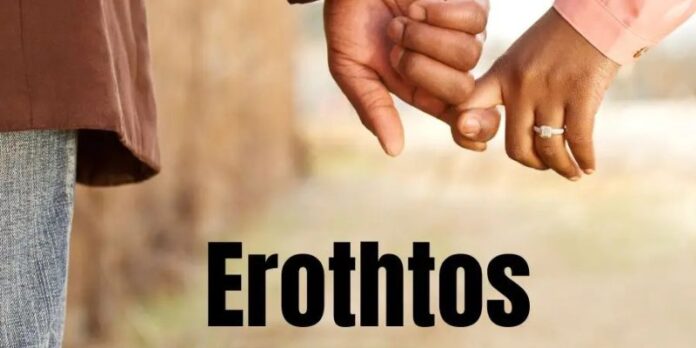Have you ever come across the word Erothtos and felt a sense of mystery? It sounds poetic, almost mythical—like something pulled from the ruins of Ancient Greece or whispered in the corridors of the Acropolis. In this blog, we’ll explore the rich tapestry behind the word “Erothtos,” its Hellenic and Hellenistic roots, and how it continues to resonate in our modern lives, especially in the realms of love, passion, and cultural identity.
What Does Erothtos Mean?
Erothtos comes from the Greek word for passionate, romantic love. It’s closely related to Eros, the Greek god of desire and one of the key figures in Greek mythology. Unlike casual attraction, Erothtos conveys something deeper—an overwhelming sense of longing, connection, and intimacy. In the world of Ancient Greek literature, especially in the Homeric epics like the Iliad and Odyssey, this kind of love was the kind that could start wars, inspire poems, and change the fate of city-states.
Greek Origins and Historical Context
To fully grasp the concept of Erothtos, we need to dive into the roots of Greek civilization. From the Minoan palaces of Knossos in Crete to the Mycenaean civilization of the Bronze Age, love and emotional expression were central to Greek society. The Aegean world flourished with tales of affection, myths, and epics.
Later, during the Classical Greek and Hellenistic period, philosophers like Plato, Socrates, and Aristotle analyzed love in deeply philosophical terms. The city-state of Athens—the intellectual heart of Classical Greece—produced poets, historians, and playwrights who contributed to the literary richness of Greek history. Erothtos, as a concept, was explored in tragedies, comedies, and dialogues, all of which formed the backbone of Western civilization.
Erothtos and Romantic Love in Antiquity
Unlike today’s simple idea of saying “I love you,” the Ancient Greeks had multiple words to express different forms of affection: Agape (spiritual love), Philia (friendship), Storge (familial love), and of course, Eros/Erothtos for passionate, romantic love.
Think of Helen of Troy, whose love sparked the Trojan War. Or Achilles and Patroclus, whose bond inspired endless scholarly debates. These were not simple crushes—they were profound connections that defined destinies.
The Language of Love: Greek Alphabet and Poetry
The Greek alphabet, derived partially from Phoenician script, allowed the flourishing of Ancient Greek literature. The poet Greeks used this script to pen some of the most iconic poems, prose, and lyrics. During the Archaic period, lyric poetry became a vessel for expressing the soul of Erothtos.
In fact, many expressions of love, desire, and affection that we use today in Modern Greek or even European languages were derived from or influenced by these early texts. From Koine Greek during the Byzantine and Medieval eras to Modern-Greek Ionian dialects, the theme of love—true love, affection, intimacy—remains central.
Philosophy, Love, and the Greek World
Love wasn’t just emotional; it was deeply philosophical. The works of Plato and Aristotle discussed Erothtos in relation to beauty, virtue, and the soul. In Plato’s Symposium, love becomes a divine force—a pursuit of the ideal form.
This kind of thinking laid the foundation for Christianity’s view of love, particularly in the Biblical and Orthodox Church traditions. The rise of the Greek Orthodox and Orthodox Church kept the traditions of Greek love poetry, rhetoric, and philosophy alive during the Dark Ages and Byzantine rule, particularly in regions like Byzantium and Constantinople.
From the Past to the Present: Why Erothtos Still Matters
Today, we might live in a world of dating apps and instant messaging, but the longing for meaningful connection is timeless. Erothtos reminds us that to fall in love is to surrender, to be vulnerable, and to embrace something eternal.
Whether in Modern Greece, the ruins of Sparta, or among the archaeological treasures of the Peloponnese, the spirit of Erothtos lives on. In Greek art, music, and grammar, in city-states like Corinth and Athens, and in every archaeological site that whispers tales of affection and conquest.
Erothtos in Today’s Digital and Cultural Landscape
From romantic novels to Instagram captions, the idea of a love that transcends time—Erothtos—is more relevant than ever. In a world influenced by Classical studies, Greek mythology, and even Shakespeare, we continue to reference these ideals.
Even in education, through homework, classics, and Greek dictionaries, students learn that love in Ancient Greece wasn’t just an emotion; it was a force, a subject of histories, dialogues, and inscriptions.
If you’re an artist, writer, or someone simply curious about love and culture, incorporating Erothtos into your own journey—whether through travel, poetry, or introspection—could change your perspective.
Quick References and Related Terms
To help you explore further, here are some words closely tied to Erothtos:
- Greek city-states, polis, and Athenian society
- Peloponnesian War, Persian Wars, and conflicts that shaped Greek history
- Philosopher, historian, and poet roles in shaping ideas of love
- Greek origins and invasions by Romans, Persians, and Turks
- The role of Hippocrates, Herodotus, and Alexander the Great in shaping a passionate civilization
- Greek music, lyre, chorus, and comedic or tragic expressions of love
- Linguistic contributions: vowels, consonants, pronunciation, and transliteration of Greek terms
Final Thoughts: Let Erothtos Be Your Compass
Whether you’re exploring the ruins of ancient Greek cities, studying Greek grammar, or simply trying to understand what it means to love deeply, Erothtos offers a path worth walking. It ties together emotion, history, mythology, and the human soul.
In an age of distraction, returning to the essence of love as the Ancient Greeks saw it might just be what we all need. So, the next time you feel something stir in your chest—a longing, a delight, a fire—know that it may just be Erothtos calling.
Catch More: Gimkit Host: Maximizing Engagement for Teachers and Educators



